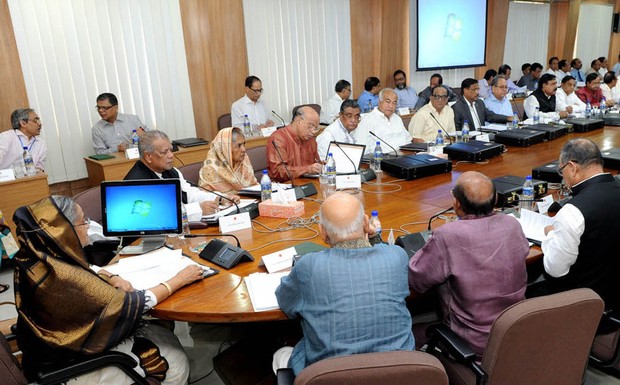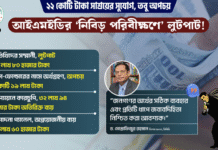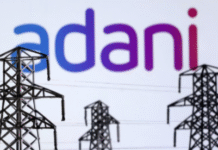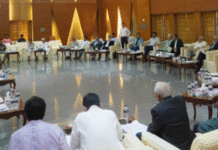The government has embargoed running news that might damage the image of the armed forces or police or create communal strife in the draft of National Broadcast Policy 2014.
The draft policy that it has approved also states talk shows cannot air comments which are ‘confusing and not true’.
A Cabinet meeting on Monday, presided by Prime Minister Sheikh Hasina, gave the go-ahead to the draft, designed to monitor and regulate the activities of television and radio stations.
Cabinet Secretary Md Musharraf Hossain Bhuiyan told reporters after the meeting that the policy contained seven sections.
“These (the sections) stipulate issues like awarding of broadcast media licences, forming of an independent broadcast commission, airing of advertisements and what cannot be broadcast and policy on other media-related issues,” he said.
An Act would be framed based on this policy, under which an independent broadcast commission will be formed, added Bhuiyan.
The commission, which will also have journalists as members, will oversee the licence approvals, finalise licence fee and broadcast activities.
The BNP immediately reacting to the policy, accused the government of plotting to muzzle media in the guise of promoting responsibility and accountability.
But the government refuted the allegation.
The cabinet secretary said, “Robbing media of its freedom is out of the question.”
“The Cabinet thinks this is a good policy and a good initiative for the broadcast industry.”
The information ministry will take all broadcast-related decisions until the independent commission was formed and the policy became an Act, he said.
The new policy prohibits airing of materials which goes against national interest.
TV and radio stations will not be able to broadcast news which might tarnish the image of law-enforcing agencies and armed forces.
It also prevents broadcasting news which might trigger communal discord as well as hamper national security.
The seven sections
The new draft broadcast policy has seven sections which mention its goals and plans.
The first section is about background, goals and strategies to implement the policy.
The second section mentions the system of license approval and the broadcast commission’s role in this.
The third one cites broadcast of news and programmes and the standards mandatory for those.
Provisions that will have to be followed while airing advertisements are in the fourth section. Those include maintaining the product’s standard and consumer rights.
Advertisements will have to be in line with Bangladesh’s culture and ideals of the 1971 Liberation War. They will also have to protect the rights of children and women.
The fifth section deals with the issues prohibited from being broadcast.
The independent broadcast commission, its formation, legal structure, responsibilities and work system are in the sixth section.
The last section is about miscellaneous issues such as how the policy will be implemented until the commission is formed.
Cabinet Secretary Musharraf Hossain Bhuiyan said this policy would be effective for all TV and radio stations including the state-owned ones.

The goals of the policy say it has been drafted to ensure the freedom of expression and free flow of information, independence of broadcast media and social accountability and manifestation of free and responsible mass media.
Dos and don’ts
The government has barred the media from broadcasting anything that pokes fun at the law-enforcing agencies and the armed forces.
“Their image cannot be tarnished,” said the cabinet secretary when asked what the media cannot broadcast as per the policy.
It restricts airing any programme that ridicules national ideals and objectives, undermines the people, and tarnishes the solidarity of Bangladesh as an independent country, according to Bhuiyan.
Apart from it, the policy proscribes broadcasting programmes that may violate personal privacy and cause adverse feelings among people of different religions and social strata.
Programmes that might jeopardise state security and hurt religious sentiments and non-communal spirit cannot be aired.
The broadcast policy restricts running anything in favour of any foreign state which may hurt other foreign countries or damages Bangladesh’s bilateral ties with other friendly countries, said the secretary.
The draft bars airing scenes harmful for any particularly community or the people.
Footages and reports highlighting mutiny, anarchy, and acts of violence shall have to be presented in such a way so that they do not encourage the acts.
“Anything that can directly or indirectly inspire corruption should be avoided,” said Bhuiyan.
Commission will punish violators
An independent broadcast commission will chalk out a ‘Code of Guidance’ for this purpose after it is formed.
Bhuiyan said the code of guidance will elaborate on penalties for breaching the broadcast policies.
An independent broadcast commission was being formed to determine anti-state elements in any programme or anything that would tarnish the country’s image, he said.

“They (the commission) will decide these things and the government will not influence it,” said the secretary.
“They will take decisions on several matters and will make recommendations to the government in some cases.”
However, Bhuiyan said the government will take every decision on implementing the policy until the commission was formed.
The commission will be headed by a chairman and be formed through a search committee. Commission members will include senior journalists, broadcast media personalities and experts.
Asked when the policy would come into effect, the secretary said a circular had to be issued and laws enacted for this purpose.
“It won’t be possible to fully implement the policy until the commission is formed,” he said adding a law will be enacted soon.
Source: BD news24










